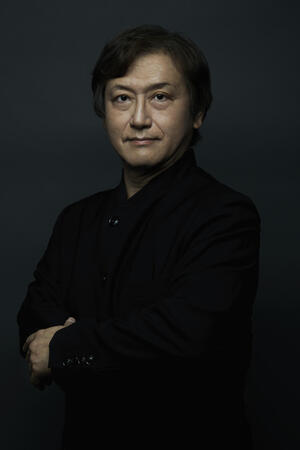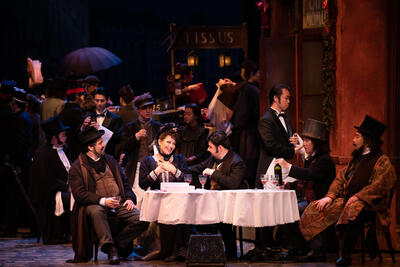Interview: Artistic Director ONO Kazushi talks about the 2022/2023 season
―I would like to ask you about the 2022/2023 season, which will mark the 25th anniversary of the New National Theatre, Tokyo. What can we expect from the new season?
The last few years have been a series of postponements, cancellations of performers, and major recasting because of the pandemic. In a way, we could say that it has helped us to accumulate experiences. Whatever happens in the 2022/2023 season, we are prepared.
Turning to the season lineup, we will open with Handel's opera Giulio Cesare, which was originally planned as the first work in NNTT's new Baroque Opera Series in 2020. This entertaining production, originally created at the Opéra national de Paris by Laurent PELLY, is set in a museum, and the drama of power, love and hate takes place amidst its collection of huge ancient sculptures and pictures. Our initial plan for the Baroque Opera Series was to follow this spectacular production with Gluck's intimate Orfeo ed Euridice, which we have recently performed in the staging by TESHIGAWARA Saburo, but the order had to be reversed because of the pandemic. In Giulio Cesare, we have cast baroque specialist Marianne Beate KIELLAND in the title role, but apart from her, the cast is the same as two years ago. The role of Cesare is sometimes sung by a countertenor, but I think when it is sung by a mezzo-soprano, it will create a contrast to Tolomeo, sung by countertenor FUJIKI Daichi. The conductor Rinaldo ALESSANDRINI will lead a historically informed performance with appropriate ornamentation and style.

ONO Kazushi
―Offenbach's Les Contes d'Hoffmann and Richard Strauss's Salome are also rescheduled performances.
Yes. For Les Contes d'Hoffmann, we have been able to assemble almost the same cast as two years ago, including the conductor. We are also happy to welcome Egils SILINS as the four villians -- Lindorf, Coppélius, Miracle, and Dapertutto. He was supposed to sing in Der fliegende Holländer here in January/February, but when his visit became impossible, I offered him Les Contes d'Hoffmann, which he happily accepted. Previously I have worked with him in Der fliegende Holländer, a role which he is renowned for, Die Walküre (Wotan) and Die Frau ohne Schatten (Barak).
Also in Salome, we have been able to maintain the original cast. Constantin TRINKS is a highly regarded German opera conductor, whom I hired as repetiteur when I was the General Music Director at the Badisches Staatstheater Karlsruhe. He is from Karlsruhe and I first got to know him when he came up to me after a rehearsal and asked me, "Maestro, this is what is written in the score, but why are you conducting it in a different way?" Through such an exchange of words with a young conductor at rehearsals, we can immediately tell if he/she has his/her own way of interpreting the score. So, I decided to take him on and hired him initially as repetiteur, and subsequently he became Kapellmeister. Now he conducts at major houses including the Bayerische Staatsoper in Munich and Opéra national de Paris.
―Other productions also feature artists who could not come to Japan due to the pandemic.
Three singers who were to sing in the cancelled Così fan tutte two years ago will now appear in Don Giovanni in December 2022. In Tannhäuser, featuring Stephen GOULD, Wolfram will be sung by Daniel OKULITCH, who was originally cast in Britten's A Midsummer Night's Dream.
―There are three productions for the 25th anniversary of the NNTT, Boris Godunov, Aida and La bohème, and you will conduct Boris Godunov and La bohème. You have previously conducted Boris Godunov at La Monnaie, Brussels.
Yes, and Boris was sung by José van DAM. It was wonderful. Boris Godunov exists in multiple versions, and we have decided to combine the 1869 original version with the 1872 revised version for this staging. The story begins with the coronation of Boris Godunov, but then the Pretender claims that he is the rightful heir to the throne, threatening Boris's power. We cut the scene where the Pretender flees to Poland and meets Marina because it a bit lengthy, and from the 1872 version, we adopt the people's chorus at the end. The focus of this opera is the way Boris slowly descends to his death. A great example is the scene where Boris is terrified by the ghost of the Tsarevich whom he killed, and exclaims "Begone, begone child!" One can observe Mussorgsky's chilly realism or terrifyingly naturalistic portrayal in the orchestral writing as well. The difficulty of conducting this work is how to express this gradual disintegration of Boris's personality.

La bohème (2020)
― What should we look our for in La bohème ?
La bohème is a love story centred around four aspiring young artists. It's an idealistic story, which may be a reflection of the composer's own personality. We know that initially the libretto was more faithful to the original, but Puccini requested many changes to the text. In this sense, I think it was Puccini's rare talent that created this ultimate story of pure love.
―Lastly, what is your message to the audience for the upcoming season?
Under recent circumstances, all of us at the NNTT have made strenuous efforts to create our productions. In particular, we have strived to present stagings of the highest quality. I am hugely thankful to our audience for their understanding of the situation. Our 2022/2023 season is full of attractive productions both visually and musically, so we look forward to welcoming you all soon!
(Interview by INOUCHI Mika)

